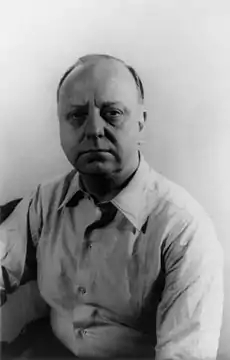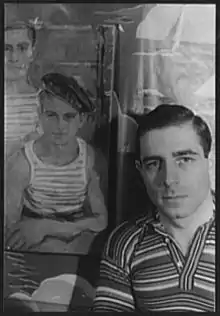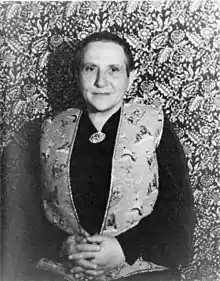Virgil Thomson
Virgil Thomson (November 25, 1896 – September 30, 1989) was an American composer and critic. He was instrumental in the development of the "American Sound" in classical music. He has been described as a modernist,[1][2][3][4][5] a neoromantic,[6] a neoclassicist,[7] and a composer of "an Olympian blend of humanity and detachment"[8] whose "expressive voice was always carefully muted" until his late opera Lord Byron which, in contrast to all his previous work, exhibited an emotional content that rises to "moments of real passion".[9]
Virgil Thomson | |
|---|---|
 Thomson in 1947, photographed by Carl Van Vechten | |
| Born | November 25, 1896 Kansas City, Missouri, U.S. |
| Died | September 30, 1989 (aged 92) Hotel Chelsea, Manhattan, New York City |
| Occupation | Composer, critic |
| Years active | 1920–1989 |
| Awards | National Medal of Arts Kennedy Center Honors Pulitzer Prize for Music |
| External audio | |
|---|---|
Biography
Early years
Thomson was born in Kansas City, Missouri. As a child he befriended Alice Smith, great-granddaughter of Joseph Smith, founder of the Latter-day Saint movement. During his youth he often played the organ in Grace Church, (now Grace and Holy Trinity Cathedral), as his piano teacher was the church's organist. After World War I, he entered Harvard University thanks to a loan from Dr. Fred M. Smith, the president of the Reorganized Church of Jesus Christ of Latter Day Saints, and father of Alice Smith. His tours of Europe with the Harvard Glee Club helped nurture his desire to return there. At Harvard, Thomson focused his studies on the piano work of Erik Satie. He studied in Paris on fellowship for a year, and after graduating lived in Paris from 1925 until 1940. While studying in Paris he was influenced by several French composers who were members of "Les Six" including: Darius Milhaud, Francis Poulenc, Arthur Honegger, and George Auric.[10][11] He eventually studied with Nadia Boulanger and became a fixture of "Paris in the twenties."[10]

In Paris in 1925, he cemented a relationship with painter Maurice Grosser, who was to become his life partner and frequent collaborator. Later he and Grosser lived at the Hotel Chelsea, where he presided over a largely gay salon that attracted many of the leading figures in music and art and theater, including Leonard Bernstein, Tennessee Williams, and many others. He also encouraged many younger composers and literary figures such as Ned Rorem, Lou Harrison, John Cage, Frank O'Hara, and Paul Bowles. Grosser died in 1986, three years before Thomson.[12]

His most important friend from this period was Gertrude Stein, who was an artistic collaborator and mentor to him. After meeting Stein in Paris in 1926, Thomson invited her to prepare a libretto for an opera which he hoped to compose. Their collaboration resulted in the premier of the groundbreaking composition Four Saints in Three Acts in 1934. At the time, the opera was noted for its form, musical content and the portrayal of European saints by an all-black cast.[13] Years later in 1947, he collaborated once again with Stein on his provocative opera The Mother of Us All which portrays the life of the social reformer Susan B. Anthony.[14] Thomson incorporated musical elements from Baptist hymns, Gregorian chants and popular songs into both scores while demonstrating a restrained use of dissonance.[10]
Thomson's contributions to music were not limited to the operatic stage, however. In 1936, he established a collaboration with the film director Pare Lorentz and composed music for the documentary film The Plow That Broke the Plains for the United States government's Resettlement Administration (RA). Thomson incorporated folk melodies and religious musical themes into the film score and subsequently composed an orchestral suite of the same name which was recorded by Leopold Stokowski and the Hollywood Bowl Symphony Orchestra in 1946 for RCA Victor (# 11-9522,11-9523).[15][16] In 1938 he also formed a collaboration with Lorentz and the operatic singer Thomas Hardie Chalmers on the documentary film The River for the United States government's Farm Security Administration.[17][18] Thomson composed an orchestra suite based on the score; when it was published, the musical journal Notes commented: "Delightful as background music, the piece is an awful bore when you try to give it your full attention".[19] Subsequently, in 1948 he collaborated with the director Robert J. Flaherty on the docufiction film Louisiana Story, for which he received the Pulitzer Prize for music in 1949.[20] At the time, the award was the only Pulitzer Prize in music granted for a musical composition written exclusively for film.[21][22] Thomson's suite based on the score was premiered by Eugene Ormandy and the Philadelphia Orchestra in 1949 to widespread critical acclaim.[23]
Following the publication of his book, The State of Music, Thomson established himself in New York City as a rival of Aaron Copland. Thomson's criticisms of Copland were phrased in terms that brought accusations of antisemitism, but Copland remained on good terms with him, and Thomson admitted his envy of Copland's greater success as a composer.[24] Thomson was also a music critic for the New York Herald-Tribune from 1940 to 1954.[25] A fellow critic, Robert Miles, accused him of being "vindictive and of settling scores in print".[26] In a 1997 article in American Music, Suzanne Robinson writes that Thomson, motivated by "a mixture of spite, national pride, and professional jealousy" was consistently "severe and spiteful" to Benjamin Britten.[27] Miles records that Thomson agitated for more performances in New York of new music, including his own.[26]
Thomson's definition of music was "that which musicians do",[28] and his views on music are radical in their insistence on reducing the rarefied aesthetics of music to market activity. He even went so far as to claim that the style a piece was written in could be most effectively understood as a consequence of its income source.[29]
Later years
In 1969, Thomson composed Metropolitan Museum Fanfare: Portrait Of An American Artist to accompany the Museum's Centennial exhibition "New York Painting And Sculpture: 1940–1970".[30][31]
Thomson became a sort of mentor and father figure to a new generation of American tonal composers such as Ned Rorem, Paul Bowles and Leonard Bernstein, a circle united as much by their shared homosexuality as by their similar compositional sensibilities.[32] Women composers were not part of that circle, and one writer has suggested that, as a critic, he selectively omitted mention of their works, or adopted a more passive tone when praising them.[33]
Awards and honors
Thomson was a recipient of Yale University's Sanford Medal.[34] In 1949, he was awarded the Pulitzer Prize for Music for the score to the film Louisiana Story.[10] In addition, the Kennedy Center Honors award was bestowed upon Thomson in 1983.[35] In 1988, he was awarded the National Medal of Arts by President Ronald Reagan.[36][37] He was a National Patron of Delta Omicron, an international professional music fraternity.[38]
Death
Thomson died on September 30, 1989, in his suite at the Hotel Chelsea in Manhattan, aged 92. He had lived at the Chelsea for close to 50 years.[39]
Works
Included among Thomson's compositions are:[40]
Symphonies
- Symphony on a Hymn Tune (1928)
- Symphony No. 2 in C major (1931, rev. 1941)
- Symphony No. 3 (1972)
Operas
- Four Saints in Three Acts, libretto by Gertrude Stein (1928)
- The Mother of Us All, libretto by Gertrude Stein, 1947
- Lord Byron, libretto by Jack Larson (1966–1968)
Ballet
- Filling Station choreography by Lew Christensen (1937)
- Parson Weems and the Cherry Tree choreography by Erick Hawkins (1975)
Film scores
- The Plow That Broke the Plains – Suite (1936)
- The River – Suite (1938)[41]
- Louisiana Story Suite film by Robert Flaherty (1948)
- La Deesse (1958)
Orchestra
- Three Pictures for Orchestra (1947–1952)
- Five Songs from William Blake (1951)
- Concerto for Flute, Strings, harp and Percussion: A Portrait of Roger Baker (1954)
- Concerto for Cello and Orchestra (1950)
- Crossing Brooklyn Ferry to poems by Walt Whitman (1958, arr. 1961)
- Mass (1960, arr. 1962)
- Pilgrims and Pioneers (1964)
- The Feast of Love according to the poem Pervigilium Veneris for baritone and chamber orchestra (1964)
- Cantata on Poems of Edward Lear (1973–1974)
- Eleven Portraits for Orchestra (1981–1982)
For piano
- Nine Portraits (1930–1969):
- Madame Dubost chez elle (1930)
- Russell Hitchcock, Reading (1930)
- Ettie Stettheimer (1935)
- Helen Austin at Home and Abroad (1935)
- A French Boy of Ten: Louis Lange (1938)
- Pastoral: A Portrait of Tristan Tzara (1940)
- Awake or Asleep: Pierre Mabille (1940)
- Prisoner of the Mind: Schuyler Watts (1942)
- For Eugene Ormandy's Birthday, 18 November 1969
- A Study in Stacked-Up Thirds (1958, rev. 1969)
- Ten Etudes (1943–1944)
- Nine Etudes (1951)
Chamber ensemble
- String Quartet No. 1 (1931, rev. 1957)
- String Quartet No. 2 (1931, rev. 1957)
- Sonata da Chiesa (three movements), for clarinet, trumpet, horn, trombone, viola, 1926
- Four Portraits, for cello and piano arranged in 1942 by Luigi Silva:
- Bugles and Birds (Pablo Picasso) (1940)
- Tango Lullaby (Flavie Alvarez de Toledo) (1940)
- In a Bird Cage (Lise Deharme) (1940)
- Fanfare for France (Max Kahn) (1940)
Bibliography
Included among Virgil Thomson's publications are:[42]
- Thomson, Virgil. (1940) The State of Music. New York. Morrow.
- Thomson, Virgil. (1945) The Musical Scene. New York. A. A. Knopf.
- Thomson, Virgil. (1948) The Art of Judging Music. New York. A. A. Knopf.
- Thomson, Virgil. (1951) Music, Right and Left. New York. Henry Holt and Co.
- Thomson, Virgil. (1966) Virgil Thomson. New York. Alfred A. Knopf.
- Thomson, Virgil. (1971) American Music Since 1919. New York. Holt Rinehart and Winston.
- Thomson, Virgil. (1981) A Virgil Thomson Reader. Boston. Houghton and Mifflin.
- Thomson, Virgil. (1989) Music With Words: A Composer's View. New Haven. Yale University Press.
See also
- Hitchcock, H. Wiley, and Robert Fussell, eds. (2008). Virgil Thomson and Gertrude Stein: Four Saints in Three Acts. Music of the United States of America (MUSA) vol. 18. Madison, Wisconsin: A-R Editions.
- Tommasini, Anthony, Virgil Thomson: Composer on the Aisle (New York City: W. W. Norton, 1999)
References
- Dickinson, Peter. 1986. "Stein Satie Cummings Thomson Berners Cage: Toward a Context for the Music of Virgil Thomson". Musical Quarterly 72, no. 3:394–409.
- Lerner, Neil William. 1997. "The Classical Documentary Score in American Films of Persuasion: Contexts and Case Studies, 1936–1945". PhD diss. Duke University.
- Kime, Mary W. 1989. "Modernism and Americana: A Study of 'The Mother of Us All'". Ars Musica Denver 2, no. 1 (Fall): pp. 24–29.
- McDonough 1989
- Watson, Steven. 1998. Prepare for Saints: Gertrude Stein, Virgil Thomson, and the Mainstreaming of American Modernism. New York: Random House, 1998; ISBN 0-679-44139-5 (cloth); reissued in paperback, University of California Berkeley Press, 2000; ISBN 0-520-22353-5
- Thomson, Virgil. 2002. Virgil Thomson: A Reader: Selected Writings, 1924–1984, edited by Richard Kostelanetz. New York: Routledge; ISBN 0-415-93795-7. pg. 268
- Glanville-Hicks, Peggy. 1949b. "Virgil Thomson". The Musical Quarterly 35, no. 2 (April): 209–225, citation on p. 210
- Glanville-Hicks, Peggy. 1949a. "Virgil Thomson: Four Saints in Three Acts". Notes, second series, 6, no. 2 (March): pp. 328–330.
- Griffiths, Paul. 2001. "Thomson, Virgil", in The New Grove Dictionary of Music and Musicians, second edition, edited by Stanley Sadie and John Tyrrell. London: Macmillan Publishers; New York: Grove's Dictionaries.
- Encyclopedia of Music in the 20th Century Editors – Lee Stacey & Lol Henderson. Routledge, New York 2013 p. 631 Virgil Thomson on http://books.google
- Encyclopedia Britannica Virgil Thomson on www.britannica.com
- Patricia Juliana Smith (2002), Virgil Thomson, www.glbtq.com
- Four Saints in Three Acts Editors: H. Wiley Hitchcock & Charles Fussell. A-R Editions for the American Musicological Society, Wisconsin 2008 ISBN 978-0-89579-629-5 pp. XVii–XViii, liii–lV on http://books.google.com
- The Grove Book Of Operas – Second Edition Editors: Stanley Sadie & Laura Macy. Oxford University Press, New York 2009 ISBN 978-0-19-530907-2 p. 424 "The Mother of Us All", Gertrude Stein and Virgil Thomson on http://books.google.com
- FDR's Moviemaker: Memoirs and Scripts. Pare Lorentz, University of Nevada Press, Las Vegas, 1992 ISBN 0-87417-186-5 pp. 39–40, 52 Memoirs of Pare Lorentz on http://books.google.com
- The Plow That Broke the Plains – Suite score by Virgil Thomson as recorded by Leopold Stokowski and the Hollywood Bowl Symphony Orchestra in 1946 on archive.org
- The River by Farm Security Administration, Paul Lorentz & Virgil Thomson on Archive.org
- FDR's Movie Makers- Memooirs and Scripts Pare Lorentz. University of Nevada Press, Reno, 1992 ISBN 0-87417-186-5 p. 53, p. 60, p. 166 Paul Lorentz, Virgil thomson & "The River" on http://books.google.com
- Evett, Robert. "Virgil Thomson: Suite from The River", Notes, Vol. 16, No. 1 (December, 1958), pp. 162–163 (subscription required)
- Virgil Thomson – Composer on the Aisle, Anthony Tommasini. W. W. Norton & Co. New York 1997 ISBN 0-393-04006-2 p. 415 Virgil Thomson & Pulitzer Prize in Music onbooks.google.com
- Virgil Thomson – Composer on the Aisle, Anthony Tommasini. W. W. Norton & Co. New York 1997 ISBN 0-393-04006-2 p. 417 Virgil Thomson's Louisiana Story Pulitzer Prize on http://books.google.com
- The Pulitzer Prizes – Music for the Film Louisiana Story by Virgil Thomson – 1949 Pulitzer prize Winner, Virgil Thomson on pulitzer.org
- Virgil Thomson – Composer on the Aisle, Anthony Tommasini. W. W. Norton & Co. New York 1997 ISBN 0-393-04006-2 p. 411, p. 414 Virgil Thomson's Louisiana Story critical reviews on http://books.google.com
- Ivry, Benjamin. "Was Our Greatest Composer-Critic an Unrepentant Anti-Semite?", Forward, April 10, 2015
- See Virgil Thomson biography here Archived 2008-11-12 at the Wayback Machine
- Miles, Robert. "Virgil Thomson All Told", The Sewanee Review, Vol. 106, No. 1 (Winter, 1998), pp. xx–xxii (subscription required)
- Robinson, Suzanne. "An English Composer Sees America: Benjamin Britten and the North American Press, 1939–42", American Music, Volume 15, No 3 (Autumn 1997), pp. 321–351 (subscription required)
- Rorem, Ned A Ned Rorem Reader (New Haven, Connecticut: Yale University Press, 2001) p. 223
- Thomson, Virgil The State of Music (New York: Vintage Books, 1962), p. 81. OCLC 729029.
- Finding aid for the George Trescher records related to The Metropolitan Museum of Art Centennial, 1949, 1960–1971 (bulk 1967–1970). The Metropolitan Museum of Art; retrieved August 6, 2014.
- Tommasini, Anthony, Virgil Thomson's Musical Portraits (New York: Pendragon Press, 1986), p. 19. ISBN 0918728517.
- Hubbs, Nadine. The Queer Composition of America's Sound; Gay Modernists, American Music, and National Identity (Berkeley and Los Angeles, California: University of California Press, 2004).
- Karen L. Carter-Schwendler. "Virgil Thomson's Herald Tribune Writings: Fulfilling the 'Cultural Obligation' Selectively", in IAWM Journal, June 1995, pp. 12–15. Now available at https://web.archive.org/web/20061003174207/http://www.iawm.org/articles_html/carter_thomson.html
- Leading clarinetist to receive Sanford Medal Archived 2012-07-29 at the Wayback Machine, tourdates.co.uk; accessed October 31, 2015.
- Virgil Thomson Virgil Thomson. Library of America & Penguin Random House, New York, 2016 p. 479 ISBN 978-1-59853-476-4 Virgil Thomson and Kennedy Center Honor on Books.google.com
- Lifetime Honors – National Medal of Arts Archived 2011-07-21 at the Wayback Machine, nea.gov; accessed October 31, 2015.
- Virgil Thomson: Music Chronicles 1940–1954 Virgil Thomson. Library of America and Penguin Random House, New York 2014 ISBN 978-1-59853-309-5 See Chronology 1988. Virgil Thomson and National Medal of Arts and Ronald Reagan on http://books.google.com
- Delta Omicron Archived 2010-01-27 at the Wayback Machine, delta-omicron.org; accessed October 31, 2015.
- von Rhein, John (1 October 1989). "Virgil Thomson, Prize-winning Composer, Influential Music Critic". Chicago Tribune. Retrieved 1 April 2018.
- The State of Music Virgil Thomson. Library of America, New York 2016 ISBN 978-1-59853-475-7 See "Chronology" , Virgil Thomson on http://books.google.com
- The State of Music Virgil Thomson. Library of America, New York 2016 ISBN 978-1-59853-475-7 See "Chronology 1937", Virgil Thomson on books.google.com
- Virgil Thomson's Publications on Worldcat Identities worldcat.org
External links
| Wikiquote has quotations related to: Virgil Thomson |
- Virgil Thomson at the Encyclopædia Britannica
- Virgil Thomson at IMDb
- Virgil Thomson on archive.org
- Virgil Thomson interview by Bruce Duffie
- Virgil Thomson (1896–1989) at Find a Grave
- Art of the States: Virgil Thomson
- Virgil Thomson Foundation
- Virgil Thomson oral histories at Oral History of American Music
- Virgil Thomson Papers at Irving S. Gilmore Music Library, Yale University
- Virgil Thomson at Music of the United States of America (MUSA)
- 'Virgil Thomson at the Chelsea': Program 12 (first half only) on YouTube, WNCN-FM (date unknown)
- 'American Arts Project: Interview with Virgil Thomson, by David Dubal – Part Two' on YouTube
- David Dubal interviewing Virgil Thomson (1 of 2) on YouTube, WNCN-FM, November 20, 1981
- David Dubal interviewing Virgil Thomson (2 of 2) on YouTube, WNCN-FM, November 27, 1981
- Review by Tim Page in The Nation of Virgil Thomson: Music Chronicles, 1940–1954. New York: Library of America. 2014. ISBN 9781598533095.
- Thomson interviewed by Vivian Perlis excerpt
- DVD with Two Thomson film scores reviewed by Roger Hall
- Guide to the Virgil Thomson Papers 1962–1967 at the University of Chicago Special Collections Research Center
- Finding aid to Virgil Thomson papers at Columbia University. Rare Book & Manuscript Library.